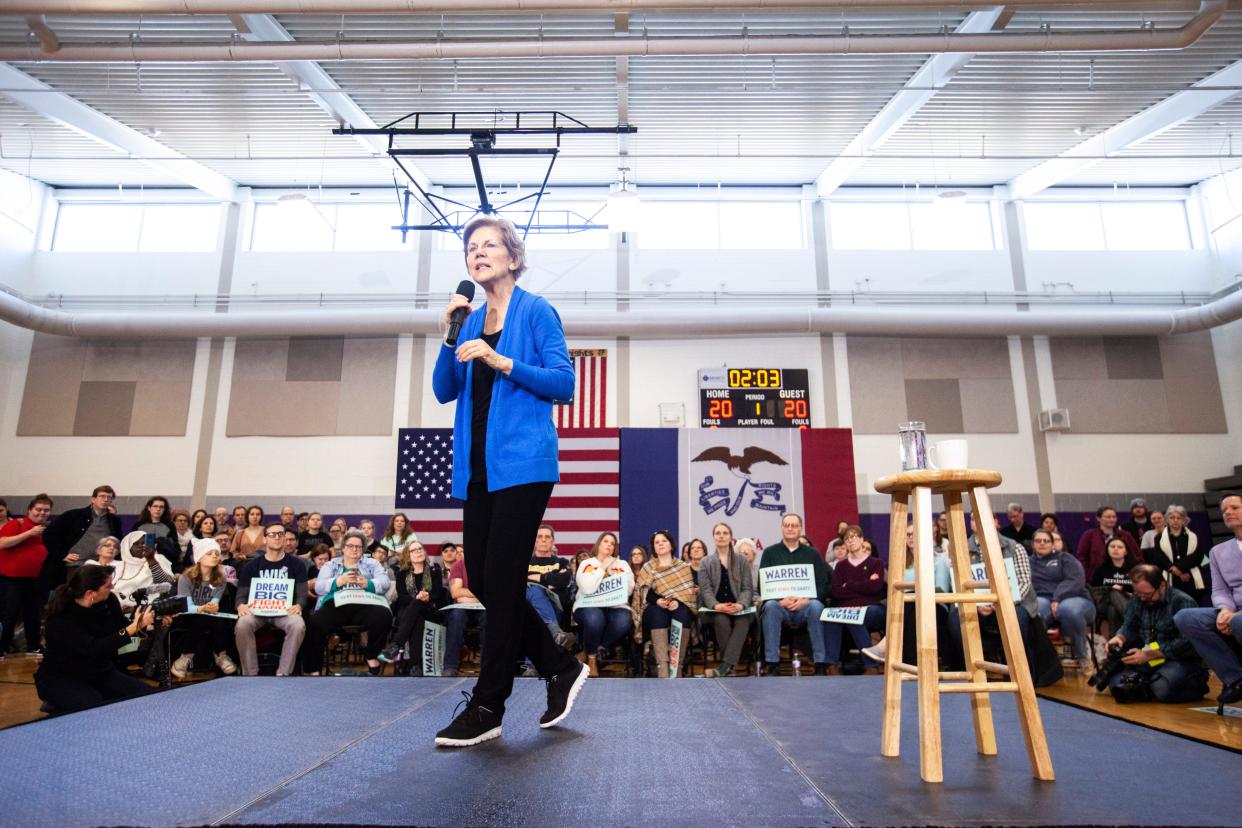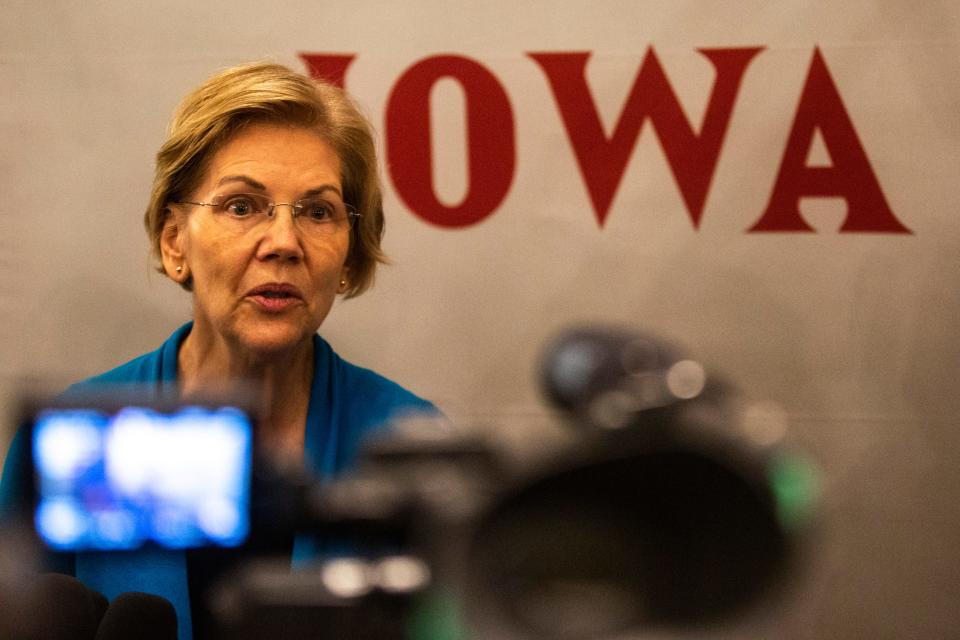Elizabeth Warren shakes up campaign style with more candid events, but still shies away from attacks

OTTUMWA, Ia. — As she slips in state and national polls, U.S. Sen. Elizabeth Warren is shaking up her campaign style in Iowa — a move that paves the way for more candid, sometimes personal events.
Instead of a 45-minute stump speech followed by three audience questions, Warren is speaking for fewer than 10 minutes and opening the rest of the hour to questions. The new format gets in at least a dozen audience questions, allowing for more crowd interaction than previous events in her nearly yearlong campaign in Iowa.
"I've just tried to change the proportion, so I just get more opportunity to hear what's top of mind for people," Warren told reporters in Ottumwa recently. "And sometimes, it's about just the reminder — here's what people are thinking about gun safety, health care, whatever it is. Sometimes, it's just because people come up with truly new questions that haven't come up before."

The senator from Massachusetts emerged as the clear front-runner in the September Des Moines Register/CNN/Mediacom Iowa Poll, when 22% said she was their first choice. In the November poll, her support slipped to 16% — second in a tight pack with U.S. Sen. Bernie Sanders and former Vice President Joe Biden, each just one percentage point below her. South Bend, Indiana, Mayor Pete Buttigieg rocketed to the top of the November Iowa Poll.
Nationally, she takes varying spots in the top 4.
As she travels across the United States and on the December debate stage, Warren has stepped up her criticism of her Democratic opponents, particularly Buttigieg and former New York City Mayor Michael Bloomberg.
But her style in Iowa is different. With the exception of Bloomberg — whom she sees as the antithesis of her efforts to root out corruption and get money out of politics — Warren rarely attacks candidates by name on the Iowa trail. Rather, she makes veiled criticisms that circle back to the crux of her campaign — that "big, structural change" is needed to turn the country around.
Supporters in Iowa, interviewed this month by the Des Moines Register during a seven-stop Warren swing in the southeast corner of the state, expressed some worry about her standing in the polls. Still, they believe she can win on Caucus Day.
"It seems to me like she has been doing very well and very steady," said Dan Williamson, an attorney from Muscatine who is deciding between Warren and U.S. Sen. Cory Booker. "She's gone up and down in kind of predictable patterns."
A year later, a changing style
It's been almost a year since Warren stepped foot in Iowa as a potential Democratic presidential nominee. Her first trip at the beginning of January coincided with the announcement she had formed an exploratory committee.
She's since held more than 90 events in Iowa, according to numbers from her campaign.
"At every event I do, we see good crowds and lots of new people in as well, and that's really exciting. We get people in the selfie line, some of whom have been here before and tell me how many selfies they've got," Warren told reporters in Clinton, Iowa, during a December trip. "But a lot of folks, too, for them it’s their first time, and that’s really exciting to see."
The new format was introduced on Dec. 1 in Marion, Iowa — the second trip after her drop in the Iowa Poll. Her campaign team sees the switch as a chance to get more candid with caucusgoers and a way to shake things up in places she's visited before, in front of people who may have already seen her.
Regardless of what's asked of her, Warren is able to highlight her capstone issues. She still gets a chance to speak on her policy positions, like "Medicare for All," immigration, gun reform, climate change and fighting corruption.
In Washington, Iowa, earlier this month, a caucusgoer asked how her Medicare for All plan would provide longterm care for seniors or people with mental disabilities. Warren had already answered several questions about health care, so she pivoted to a plan that she believes will spur more affordable housing for low-income families, the homeless, seniors and the disabled who want to live independently.
As in her national campaign, Warren has softened on her Medicare for All plan — an issue that competitors have targeted. In Iowa, she's highlighted her transition plan, which would allow people to opt-in to a public option that would automatically be available to low-income families and children under 18. Congress would then vote in three years to extend the public option to all Americans.
But, unlike elsewhere in her campaign, her answers to audience members' questions don't criticize her fellow candidates. When asked by a caucusgoer in Ottumwa how she differs from Sanders, she declined to comment.
"I just have enormous respect for Bernie, and I'm just not gonna stand here and — no, I'm not," she said, before describing why she's running for president. "I want to see an America that works for all our kids."
But in closing remarks, she often highlights major differences between herself and other candidates — presumably Buttigieg and Biden. She says she doesn't host high-dollar fundraisers and she's only proposing "ideas and solutions that are big enough to deal with the problems in people's lives."
"Look, I understand you can make yourself sound so smart, so sophisticated by giving up on big ideas. But here's the thing: When we give up on big ideas, we give up on the people whose lives will be touched by those big ideas," she said in North Liberty, Iowa, on Saturday.
"This country is in crisis, and Washington insiders and media pundits and even a lot of folks in our own party don’t want to admit it," she said. "They think that running a vague campaign that nibbles around the edges of these big problems is somehow a safe strategy.
"If the best that Democrats can offer is business as usual after Donald Trump, then Democrats will lose."
Later, when pressed by reporters about Buttigieg's "Medicare for All Who Want It" plan, she offered some criticism: "His plan is not offering full health care coverage to anyone. His plan is still about high deductibles, about fees, about co-pays and about uncovered expenses," Warren said.
Her supporters are unafraid
Iowa caucusgoers who say they're committed to Warren said her drop in the polls is predictable, based on competitors' attacks and enhanced media attention.
"They're going to give everything they have to fight Liz," said Joyce Steen, 71, of Clinton. "I think this is showing in her polls. Hopefully, she regains and starts bouncing back."
Some backers suggested she should host more events in Iowa. According to the Des Moines Register's candidate tracker, she's held fewer events than seven other Democratic presidential candidates.
Jennifer Nelson, 67, of Fairfield, Iowa, said she's been following Warren since her 2012 Senate run and likes that she's relatable, authoritative and, given her background studying financial problems, well-informed on her top campaign issues.
Nelson said it's difficult to predict a caucus winner, so she's not worried where Warren stands less than two months out.
"It's why I’m here when I don't need to be sold on anything," she said. "I want people to see that there are people that are passionate about her."
Williamson, the attorney from Muscatine, said given new caucus rules this year, a candidate doesn't necessarily have to "win" to continue through to the nomination.
"My guess is this year, instead of three tickets out of Iowa, there's going to be four or five. Everything seems to point toward she's going to be in that thing, and, as long as she's doing well and remains viable, she's going to be all right," he said. "I think as long as she's in that top four or five, she's going to be fine."
Kim Norvell covers Elizabeth Warren, and growth and development for the Register. Reach her at knorvell@dmreg.com or 515-284-8259.
This article originally appeared on Des Moines Register: Election 2020: Elizabeth Warren campaign style changes as polls slip

